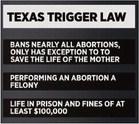Texas now has three significant abortion bans on the books.
As of Aug. 25, performing an abortion in Texas is now a felony punishable by up to life in prison after the state’s trigger law went into effect.
The law was ‘triggered’ when the U.S. Supreme Court issued its judgment in Dobbs v. Jackson, overturning Roe v. Wade and allowed states to set their own laws about abortion.
Texas now has three significant abortion bans in place and several administrative regulations governing the procedure.
The trigger law criminalizes performing an abortion from the moment of fertilization unless the pregnant patient is facing “a life-threatening physical condition aggravated by, caused by, or arising from a pregnancy.”
Violations of the law are punishable by up to life in prison. The statute also says that the attorney general “shall” seek a civil penalty of not less than $100,000, plus attorney’s fees.
The Texas District and County Attorneys Association raised concerns about the language due to a 1995 case where the SCOTUS ruled that a defendant convicted and punished for a criminal offense cannot also have a non-remedial penalty imposed.
By requiring the attorney general to purse a minimum six-figure civil penalty for the same conduct that may incur a felony sentence of imprisonment and a criminal fine, the legislature may have created the legal framework to prevent a criminal conviction for certain violations.
Several major cities are considering measures that prohibit the use of local funds to investigate or prosecute abortion-related crimes, and district attorneys in five large counties — Bexar, Dallas, Fort Bend, Nueces and Travis — have said they won’t bring criminal charges in these cases.
Many lawmakers have said they intend to propose legislation to allow prosecutors to bring abortion cases outside their own jurisdiction if the local district attorney won’t.

